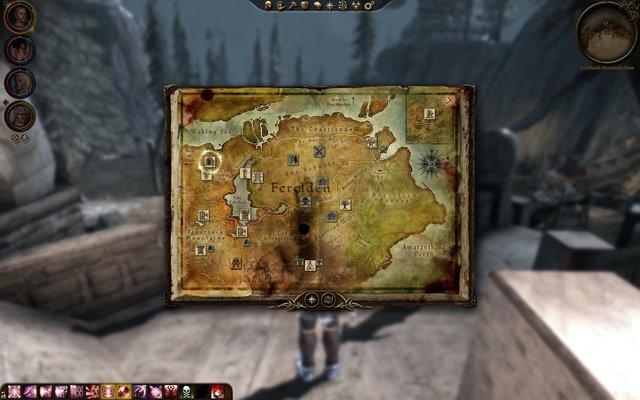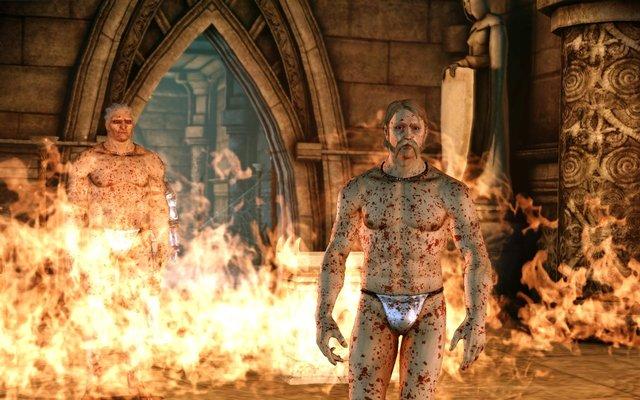The machine slowly comes to life, the sound of whirring fans and arcane instruments powering up to a deafening howl. Then a blinding flash of incandescence, a painful sense of sudden detachment from where and when you were. Also all your clothes are apparently gone, unfortunately burnt away by the paradox. Uh-oh.
Yes, playing Dragon Age is like taking a trip back in time. Not back to the pseudo-historical-yet-entirely-fictional fantasy universe it is set in, because it never happened! I’m telling you, all that conspiracy theory stuff about William the Conqueror using dragons at Hastings is completely bogus. I was there, it never happened, no chance.
No, the time it takes you back to is around 2004, when the game was first announced. It was an extended development process, and as is often the case, elements of the game feel dated as a result. But mostly in a good way. While Bioware took things off in a completely different direction with the Mass Effect series, all streamlined, shiny sci-fi action, Dragon Age is much more of an RPG throwback. The fantasy setting lead to it being labeled the ‘spiritual successor’ to Baldur’s Gate, but in many other aspects the game it most resembles is Knights of the Old Republic.

The universe they’ve created is not a huge departure from every other fantasy universe ever, but it’s differentiated enough from Tolkien et al to feel distinct. Elves are second class citizens or living wild, Dwarves are pretty much the same except not all Scottish (good call that one) while the monstrous hordes threatening the world (‘the blight’) are pretty much a cross between orks and the undead, I think? There is also a dragon leading them, a demonic undead dragon, bad combo. On the surface nothing about the world is hugely original. They’ve taken Medieval Europe, flipped it upside-down and presto, that’s more or less the continent and constituent nations of Thedas. You’ll also run into plenty of fantasy stalwarts like giant spiders, zombies and ogres.
There are six different origin stories, some of which follow the classic Bioware setup of everything being fine and then suddenly why is everything on fire and we’re under attack! It’s a nice idea having a different introduction depending on race and social standing, it certainly helps to give the player character’s backstory a bit more weight than a simple block of text. All the origin stories will swiftly lead you into the service of the Grey Wardens, who bear more than a passing resemblance to Jedi, or Spectres for that matter.
The overarching story leads you on a decidedly epic quest to get the support of the disparate peoples of Ferelden, which is kind of the England of Thedas, inclement weather and all. The codex files away the descriptions of all the places, people, organisations and creatures that you slowly pick up throughout the game, and eventually will come to take on novelistic proportions all by itself. There is an enormous amount of incidental writing there to flesh out this world.

Talking of epic, the game is easily 40 or 50 hours long if you get involved with the array of sidequests. On the higher difficulty settings its no walk in the park either, which makes the sidequests all the more worthwhile. Combat is real time, able to be paused at any moment and relying on RPG mechanics not too dissimilar from the Dungeons and Dragons setup many previous Bioware titles used. It can become quite tactical and complex, requiring a fair degree of micromanagement on the harder settings. You can control all four party members, issue them orders while pausing the action, and manage their default actions to a highly refined degree. It’s possible to spend ages specifying each character’s response to all kinds of situations, or you can just give them a more general utilitarian role – ranged, tank, melee and so forth.
The RPG systems here feel like a streamlined version of D&D, three archetypal classes to choose from (warrior, rogue, mage) and four specialisations for each. Skills aren’t very important, talents (basically feats) or spells are vital, and you have six attributes although they work a little differently from D&D and you get three points to spread around each time you level up. The inventory system offers all the inventory goodness you’d expect from a fantasy RPG – there are slots aplenty and a great deal of choice about what equipment you assign to them. It’s not just about what equipment is best, but also your personal doctrine. The crafting system is deep and useful, and weapons can be enchanted.
The soundtrack is also worthy of mention; a stirring, celtic-tinged affair which generates a lot of atmosphere by itself, much like some kind of musical rainforest. It’s a superb melodious backdrop which never gets tiresome despite the game’s extended running time. It does sound suspiciously familiar in a couple of places though, taking the Lord of the Rings parallels perhaps a little far.

The graphics look a little dated on the whole; while character models and particle effects are good, the environments in particular look nowhere near as advanced as the first Mass Effect. The interface and hotkey systems don’t work fantastically on console, the designers having a hard time paring down all the functionality that a PC setup allows. There are also some performance issues with the console versions, since this was assuredly a PC game that was then converted. The game also has probably more than it’s fair share of bugs, most of which are fairly minor.
As with all Bioware titles though, Dragon Age is much more than the sum of its parts. While much of it is hardly revolutionary, this is an enjoyable game which is greatly elevated through strong writing and production values. The excellent dialogue, voice acting and characterisation helps create a colourful, likable collection of characters. There’s likely to be someone here you can relate to, whether that be the wise-cracking Alistair, sarcastic and brooding Morrigan, lovable redhead Leliana, irritating bisexual elf-assassin Zevran, or even the dog. Maybe not the dog.
Characters regularly banter with each other as you wander the land, you can chat endlessly with them at the party camp and their approval of you will depend on your actions throughout the game. Most of them have dark and intriguing backstories, and there’s a consistent theme of redemption. For almost every member of the party there is a crisis moment where they may turn against you depending on your actions and you can refuse to recruit most of them or ask them to leave whenever. Although if you get rid of almost everyone it is quite a depressing and lonely campsite I imagine. Just a couple of guys sitting around a fire, glaring into the flames, having nightmares and waking each other up all the time to talk about them. Bleak.

The approval system kind of replaces the good/evil morality system in most recent Bioware games, and it’s a vast improvement (if entirely the same as the one in Neverwinter Nights 2). It allows the game to be much more morally fuzzy, rather than having to imprint certain arbitrary good/evil points onto your actions. The big decisions aren’t always clear cut, and sometimes the eventual outcome will be nothing like you expected. The tone moves around quite a bit, with plenty of lighter moments and some decidedly grim elements. The political machinations are fairly well fleshed out, again with some degree of moral ambiguity and a healthy amount of backstabbing. The degree to which you can affect the eventual outcome is quite profound, which will doubtless cause them some serious headaches for the already-underway sequel.
Dragon Age has received a lot of plaudits since coming out, and deservedly so. The characters and setting may start off seeming a little familiar, but they are developed throughout so that they move far beyond archetypes by the time the denouement hits, and you can find yourself forming a genuine emotional attachment. The depth and challenge offered by the game itself is impressive, while the set pieces are cinematic and memorable. Overall this is one of the best RPGs in many a year, and a welcome continuation to a great legacy of games where you are guaranteed to run into giant spiders, zombies, ogres and yes, some dragons.


i really enjoyed my ~58 hours with this game. its better than mass effect 2 (which i started soon after finishing DA and am currently playing) in all of the ways i can think of without trying too hard.
fantasy is better than sci fi
fighting is better because you have more control over your whole party
fighting is better because there is more diversity among the classes
fighting is better because magic and swords are better than guns (see pt 1)
paragon/renegade is stupid and sets up bad incentives
finally (and i dont have any evidence to support this, its a “feeling” i have after spending a good amount of time with both games) dragon age muddies the water on morality more often that mass effect 2. in ME2 it is usually quite clear what the “right” answer is, and this was not ALWAYS (though it was frequently) the case in dragon age.
ps – there are some great jokes in this review. well done.
Pat, is the Mass Effect comparison appropriate? While the games are from the same company, ME has never been about straight up morality, but good cop/bad cop (wherein you’re always still a cop who saves the day).